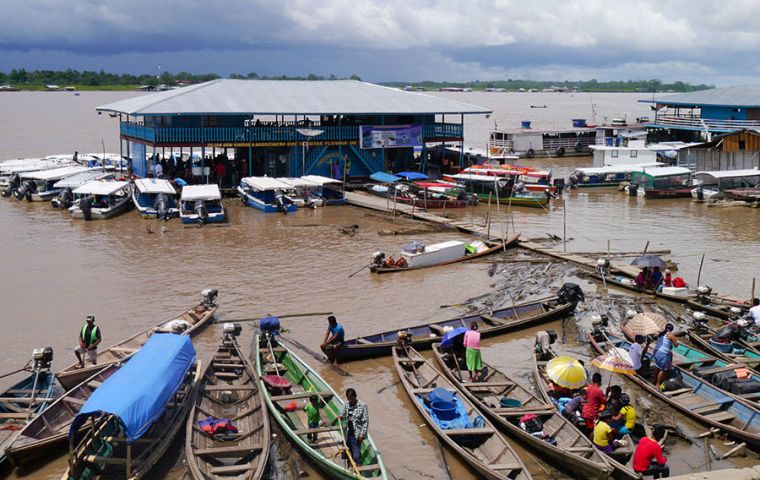MercoPress. South Atlantic News Agency
Indigenous woman in the Brazilian Amazon tests positive for coronavirus
 The patient, whose name was not made public, is a medical worker who had travelled upriver to several villages, including the town of Tabatinga (Pic Wikimedia)
The patient, whose name was not made public, is a medical worker who had travelled upriver to several villages, including the town of Tabatinga (Pic Wikimedia) An indigenous woman in a village deep in the Amazon rainforest has contracted the novel coronavirus, the first case reported among Brazil's more than 300 tribes, the Health Ministry's indigenous health service Sesai said on Wednesday
The 19-year-old woman from the Kokama tribe tested positive for the virus in the district of Santo Antonio do Ica, located near the border with Colombia some 880km up the Amazon river from the state capital Manaus.
“Unfortunately, we have an indigenous person with the virus,” said a Sesait spokeswoman by telephone.
The patient, whose name was not made public, is a medical worker who had travelled upriver to several villages, including the town of Tabatinga, and returned home with fever, a sore throat and chest pains, the O Globo newspaper reported.
Four cases of coronavirus have been confirmed in the same district, including a Brazilian doctor who tested positive last week, raising fears that the epidemic could spread to remote and vulnerable indigenous communities with devastating effect.
The doctor, whose name was not made public, had returned from vacation in southern Brazil to work with the Tikunas, one of the largest tribe in the Amazon with more than 30,000 people who live in the upper Amazon near the borders with Colombia and Peru.
Health experts warn that the spreading virus could be lethal for Brazil's 850,000 indigenous people, who have been decimated for centuries by diseases brought by Europeans, from smallpox and malaria to the flu.
Health experts say the indigenous peoples' way of life in communal hamlets under large thatched structures increases the risk of contagion if any single member contracts the virus, which causes the sometimes fatal respiratory disease Covid-19.




Top Comments
Disclaimer & comment rulesCommenting for this story is now closed.
If you have a Facebook account, become a fan and comment on our Facebook Page!